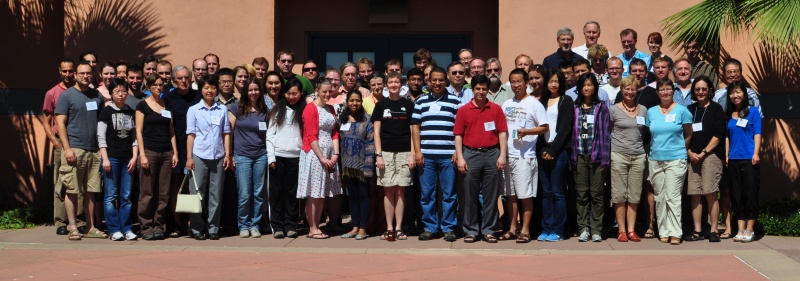Cider 2012
"Deep Time: How did early Earth become our modern world?"CIDER 2012 Summer Program, July 1 - August 10, 2012, KITP, Santa Barbara (CA) |

A major theme of the 2012 CIDER Summer Program was to explore the connections between the modern and Early Earth through a multidisciplinary approach, combining contributions from geochemistry, mineral physics, seismology, geodynamics and geomagnetism. One of the key problems is the influence of early Earth processes on the ensuing chemical and physical dynamics of the planet, including geochemical differentiation, the genesis of plate tectonics and the conditions leading to planetary habitability.
Read more about the science motivation.
Summer Program links
- 2012 Summer Program Description at CIDER main site
- Presentations and Agenda
- Summer Program Participants
- Research Groups Projects (login required)
- Group Project Presentations
- Summer Program Tutorials (login required)
- 2012 Summer Program Photos
- CIDER 2012 evaluations from students and post-docs
- CIDER 2012 comments from lecturers and senior participants
- CIDER 2012 AGU abstracts
Program Organizers
Marc Hirschmann (lead organizer)
Sujoy Mukhopadhyay
Bruce Buffett
Barbara Romanowicz
Schedule
Weeks 1-2 (July 1- July 14, 2012):
Informal program
Weeks 3 - 4 (July 15-July 28th, 2012):
Tutorial Program for advanced graduate students and post-docs
Instructors: (Confirmed) Geochemistry: Rick Carlson (DTM), Mark Harrison (UCLA), Bill McDonough (U. Maryland), Sujoy Mukhopadhyay (Harvard U.) Geodynamics: Michael Manga (UCB), Bruce Buffett (UCB), David Stevenson (Caltech), Louise Kellogg (UC Davis) Mineral Physics: Marc Hirschmann (U. of Minn.), Jie Li (U. of Michigan), David Rubie (U. Bayreuth) Seismology: Ed Garnero (ASU), Guy Masters (UCSD), Barbara Romanowicz (U.C. Berkeley)
Weeks 5-6 (July 29th-August 10, 2012):
Workshop following tutorial program and informal interactions
Other senior participants that plan to attend (schedule forthcoming): Thorsten Becker (USC) Vernon Cormier (U. Conn.) Adam Dziewonski (Harvard) Stan Hart (WHOI) Abby Kavner (UCLA) Richard O'Connell (Harvard) Sarah Stewart (Harvard) Kevin Zahnle (NASA Ames)
As in previous CIDER summer programs, the program will begin with 2 weeks of KITP style unstructured program, as well as 2 weeks of tutorial for advanced graduate students and post-docs, followed by 2 weeks of follow-up "workshop", during which themes that emerged during the tutorial will be further explored within multidisciplinary teams including junior and senior participants.
A "kick-off" workshop was held at Berkeley on December 10, 2011. Presentations are available on the workshop website.
Participation
Researchers at the assistant professor level and higher are welcome to sign up for any part of the program, and we encourage overlap between the first and second part of the program.
The unstructured part of the program is meant to facilitate interaction between members of the community that have burgeoning plans to develop collaborative projects. Come to CIDER to plan your CSEDI proposals!! You will have office space, access to a desktop computer and printers, a quiet environment away from your home institution, and the possibility to interact with colleagues from various disciplines in an informal way.
Graduate students and post-docs : The lecture/tutorial program is meant for graduate students that have completed their qualifying examination, as well as post-docs. Some exceptions may be granted if well justified. The lecture program is designed to bring everyone to a fundamental understanding of progress and challenging in disciplines other than their own.
Graduate students and post-docs signing up for the tutorial part (weeks 3-6) are required to stay at least for the first 3 weeks of the tutorial program. Priority will be given to those who commit to stay for 4 weeks.
Participants may bring spouses and we will do our best to accommodate families, and in particular give references for childcare. There are many programs for children on and off campus.
Support:
Travel and on-site expenses will be provided to those that stay for two weeks or longer. We cannot provide support for travel from outside of the US. However, on-site support for foreign participants will be provided.
The number of participants is limited, so early applications are encouraged!
Support for CIDER 2012 p articipants will be provided by the NSF/FESD program through the CIDER Synthesis Center gran t to U.C. Berkeley (PI B. Romanowicz).
Location
This summer program will be held at the Kavli Institute for Theoretical Physics (KITP) in Santa Barbara, CA, USA. Support for CIDER 2012 participants will be provided in the framework of the CIDER Synthesis Center grant from the NSF/FESD program.
Application deadline: February 1, 2012